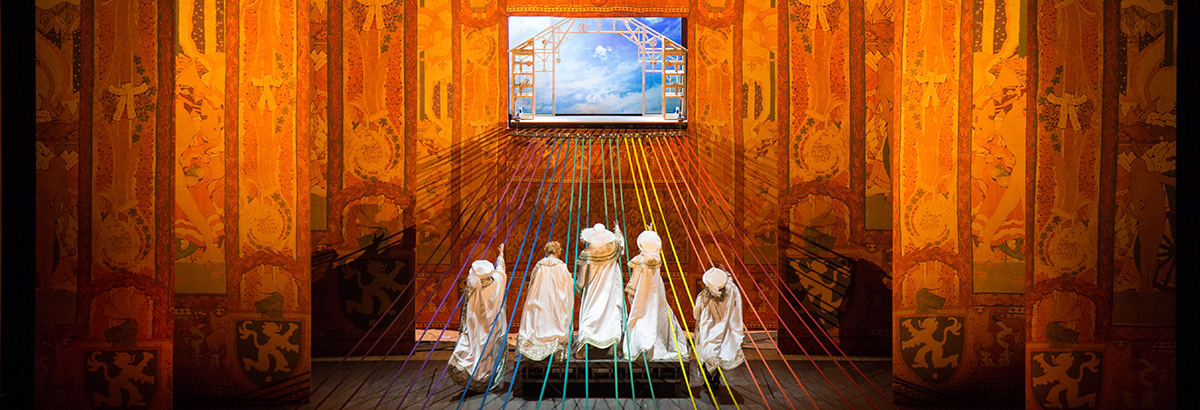April 10, 2020
A Vote for Das Rheingold
From the sustained E-flat chord that opens the work in the depths of the Rhine to the final grand entrance of the gods into Valhalla, Das Rheingold is filled with musical glories. There is nonstop action, a rarity in Wagner operas, as the composer keeps the pedal to the metal.
Rheingold’s brevity (about two and a half hours without intermission) yields a musical and dramatic urgency separating it from the later Ring operas. The momentum is constant – there’s no looking back as in Wotan’s lengthy monologue in Die Walküre, the Q & A session between Wotan and Siegfried in Siegfried, or the Norns’ prolonged narrative that opens Götterdämmerung.
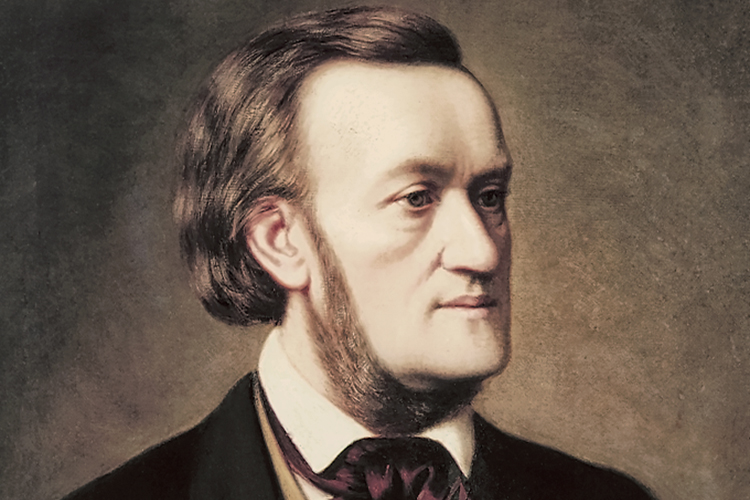
Sir David Pountney, director of Lyric Opera of Chicago’s new Ring cycle, has commented that Rheingold brings “wit, color and a vivid sense of storytelling...probably the best story of the four operas...It has a very good, fast-moving narrative structure.” Indeed, with its gods and giants, dwarves, and the aquatic sisters – as well as its brevity Rheingold actually provides an inviting introduction to Wagner for youngsters, whose aural sensitivities may not be ready for the extended challenges of the later Ring operas, to say nothing of Tristan und Isolde or Parsifal.
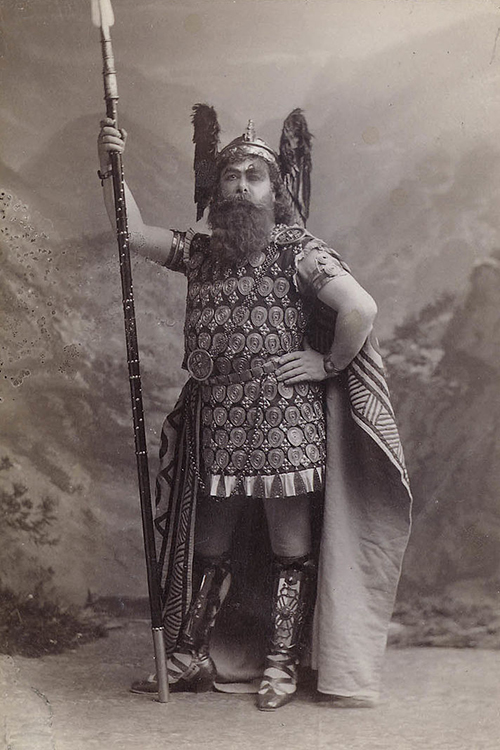
Although Das Rheingold – what Wagner described as a “Vorspiel” (prelude) to the Ring – doesn’t include the cycle’s best-loved and most recognizable melodies, it’s a popular work in its own right and has continued to build audiences worldwide. There have been more than 100 performances of the opera in nearly 30 cities since the start of 2014 alone. This includes major houses in Bayreuth, Munich, Vienna, and Amsterdam but also lesser-known theaters in Bulgaria, Norway, South Korea, and Kazakhstan. Rheingold has ranked among the top 40 of the most-performed operas internationally for nearly all of the past decade, second only to The Flying Dutchman among Wagner’s works and often ahead of such operatic staples as Norma, Der Rosenkavalier, Fidelio, Faust, and Salome.
Wagner’s Ring often has drawn comparisons to J.R.R. Tolkein’s The Lord of Rings trilogy with Rheingold playing the role of The Hobbit, Tolkein’s brief introduction to his epic saga. But Rheingold has far more meat on its bones than The Hobbit, which offers little more than an appetizer for the main course yet to come – despite director Peter Jackson’s attempt to turn a short book into a three-movie extravaganza.
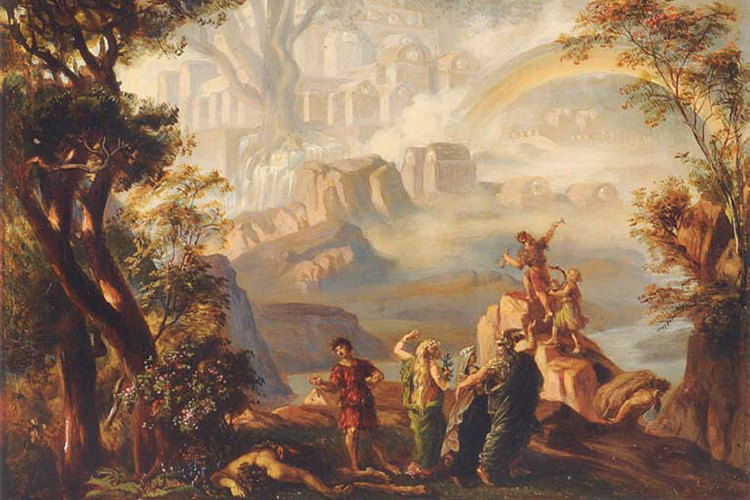
In Das Rheingold, Wagner establishes a musical vocabulary for the remainder of the Ring cycle, particularly the leitmotifs (signature themes) associated with characters, situations, and even particular objects through all four operas. Rheingold’s music hints at events yet to come – for example, Loge’s Scene Two narrative foreshadows the “Forest Murmurs” of Act Two in Siegfried. The thunderous music that accompanies Donner’s calling to the mists in Scene Four reappears almost immediately in Die Walküre’s opening measures as Siegmund dashes through a violent storm to escape Hunding’s kinsmen. And Erda’s music that warns of the gods’ ultimate doom returns at the very end of the tetralogy as Valhalla burns. Throughout Das Rheingold the music feels new and fresh. Indeed, in the very first words of the opera, with the River Rhine flowing as if at the beginning of time, the Rhinemaiden Woglinde speaks of early childhood: “Surge, wave, make our cradle rock.” In effect, we are present at the creation.
Dramatically, this is an endlessly fascinating work as well. Unlike the subsequent Ring operas, most of the characters in Rheingold understand the high stakes, particularly once Alberich steals the gold from the Rhinemaidens and forges it into the all-powerful ring. And they know one another’s back stories. The giant Fasolt, for example, says of Alberich, “The Nibelung has done [the giants] much harm.” Fricka dismisses the flirtatious Rhinemaidens, noting, “Let me hear nothing about that watery brood…many a lovesick man have they lured into the flood.”
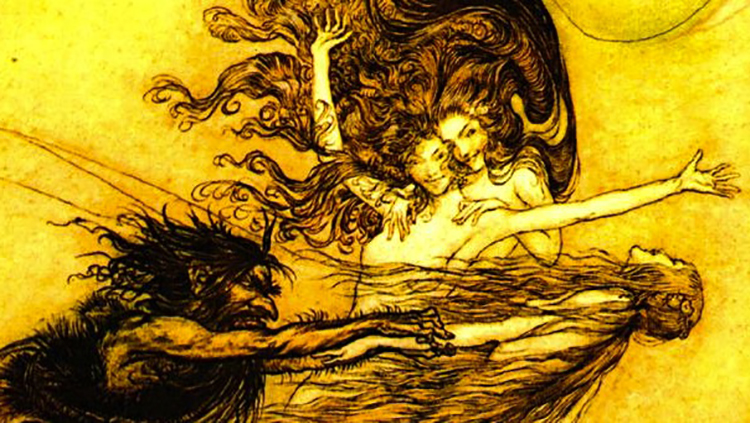
In contrast, although audiences later in the cycle can applaud the brave innocence of Siegmund, Sieglinde, and their son Siegfried, these characters know next to nothing about their places in the larger drama. Even worse are Götterdämmerung’s clueless Gibichung siblings, Gunther and Gutrune, maneuvered like puppets by Hagen, their villainous half-brother. There are no small roles in Rheingold. Secondary characters such as Erda, Donner, and even the giants Fasolt and Fafner have moments of beauty, power, and eloquence.
Erda, the primordial Earth goddess who seems to come from a long-ago epoch that geologists call Deep Time, warns Wotan in Scene Four to “flee the curse of the ring.” She lets him know that her three daughters, the Norns (an operatic precursor of the three precogs in Steven Spielberg's 2002 film Minority Report) weave the threat of destiny. Erda then adds ominously a “doom-laden day is dawning for the gods.” Although her music somewhat resembles that of the surging Rhine that opens the opera, this time it’s in a minor key and far slower. Carolyn Abate and Roger Parker, in their authoritative survey A History of Opera, write, “It’s as if the water has turned glacial.”
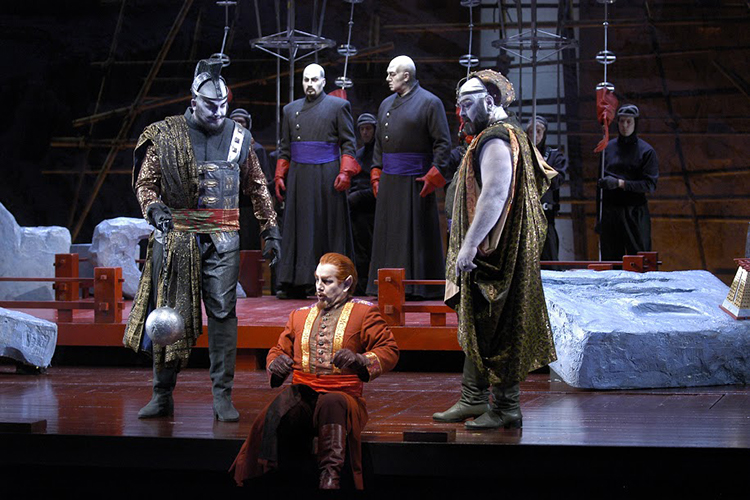
Another supporting character, Donner, the god of thunder, can make a monumental effect as well. Later in Scene Four he delivers his call to the mists. With a mighty hammer blow the god of thunder clears away the clouds and fog, allowing the gods a full view of Valhalla in its true splendor – certainly one of the most exciting passages in all Wagner.
The opera’s three main characters – the chief god Wotan, the demigod of fire Loge, and the dwarf Alberich – take turns providing Rheingold with its twists and turns. Wotan is a conflicted god who often acts more like a wheeler-dealer politician than a divine being. “He is a great figure, but, at thesame time, he’s flawed,” Pountney has noted. “Wotan is a very tormented and challenged person – politically, emotionally, sexually, and domestically.” And, for sure, Wotan will make some disastrous decisions throughout the Ring.
When John Updike wrote his famous essay in The New Yorker about Ted Williams’s final game in 1960, he said of Williams’s refusal to tip his cap to Red Sox fans at Fenway Park after hitting a home run in his last at-bat, “Gods do not answer letters.” Wotan gives the impression that not only does he answer letters – he probably reads the other gods’ mail as well. He’s not a bad fellow per se but his actions, particularly his dismissive treatment of his wife Fricka and his double-dealing with the giants regarding payment for the construction of Valhalla, often fail to position him in the best light.
Loge blends wit, intelligence, and cynicism. He likes to view himself as the smartest guy in the room or the brightest god on the mountaintop. Generously, he has been described as Wotan’s secretary of state, the gods’ ambassador to the world at large. But Loge is also a political fixer who spends much of his time cleaning up his boss’s mess. His quicksilver music helps separate Loge from the other gods, who, other than Wotan, treat him with suspicion and regard him as an outsider. And yet this shape-shifter also has music of substantial beauty. His Scene-Two description of wandering the Earth to find a substitute for love sounds, in parts, like a Schubert song. Alberich travels the longest journey. At the start of Das Rheingold, he’s a playful albeit somewhat grubby dwarf who longs to frolic in the waves with the Rhinemaidens, telling them, “Ha, ha, you nymphs, how graceful you are.” By opera’s end he has become a breeder of evil and danger. After being dispossessed of the ring by Wotan he produces his awful curse: “Now [the ring’s] magic shall breed death for him who wears it.” He despoils nature. When Alberich forswears loves and makes off with the magic gold at the end of Scene One the once buoyant music of the Rhine turns dark as if the life-giving waters have receded, leaving a barren riverbed in its wake. Later in the opera, the subterranean kingdom of Nibelheim also suffers hard times under Alberich’s lash. His brother Mime moans, “We used to laugh merrily as we worked.” There are no laughs with Alberich calling the shots.
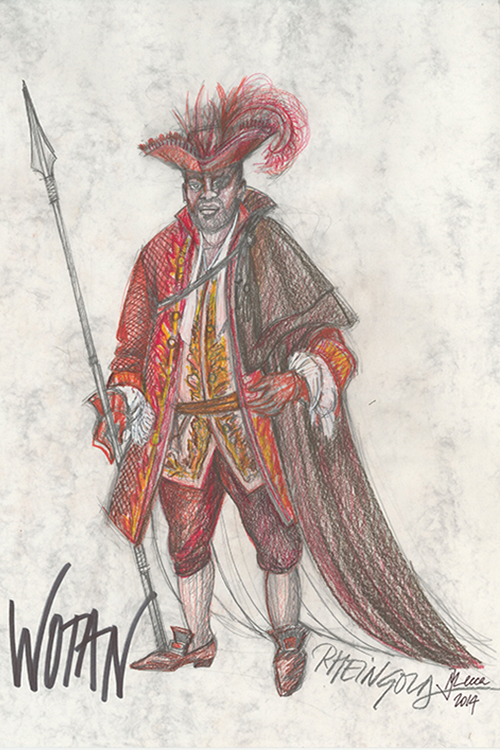
Das Rheingold sits fifth among Wagner’s mature operas, following by six years the completion of Lohengrin. Wagner composed the music to Das Rheingold in late 1853 through mid-1854, but it took another 15 years for the opera to receive its world premiere, September 22, 1869, in Munich. Two of Germany’s most important artists of the time were heard in key roles – bass-baritone August Kindermann (Wotan) and tenor Heinrich Vogl (Loge).
Under the guidance of an accomplished conductor with top-flight singers and imaginative set designs, Das Rheingold’s 150 minutes can pass quickly. And as the curtain prepares to lower, all appears well. With Wagner applying the full force of the orchestra, the gods cross the rainbow bridge into their new home of Valhalla, blissfully ignoring the pleas far below from the Rhinemaidens who seek the return of their gold.
A happy ending? Not really. The crafty Loge notes, “[The gods] are hastening to their doom. I am almost ashamed to have any share in their doings.” Pountney suggests Wagner is being ironic and that the music that many listeners regard as majestic also could be interpreted as “bombastic” or even “a lot of BS.” Yes, Valhalla provides a prestigious new address but the gods are ruling on borrowed time. Golden ages, be it the Age of Pericles, the summit of the British Empire, or what historians call The American High of 1946-64, rarely last long.
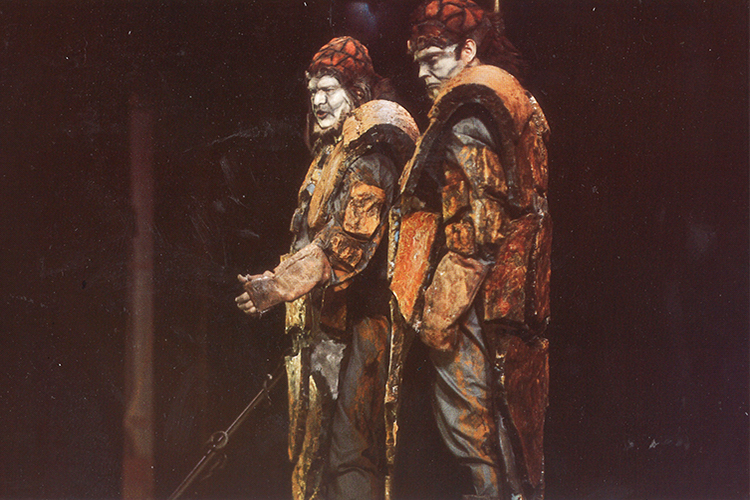
The latter three operas of the Ring cycle will find the gods less powerful and far less able to control events. Alberich’s dire warning will carry through the years: “Keep the ring. Guard it well. You shall not escape my curse.” This menacing dwarf will haunt Wotan and his offspring for the rest of the saga. Never again will we see Donner, the rainbow god Froh, or the goddess of beauty Freia. Fricka appears for one scene in Act Two of Die Walküre and that’s it. Erda emerges only briefly at the start of Act Three in Siegfried. Even Wotan is gone by Götterdämmerung. Loge becomes the Ring’s silent partner. His fire – and music – surround Brünnhilde’s rock in the final three operas but his voice is stilled.
The Twilight of the Gods has begun long before Götterdämmerung. For the present, however, it's not bad to be an immortal in Valhalla. As Das Rheingold ends in apparent triumph, why not follow the words of Loge (sarcastic though they may be), who advises the Rhinemaidens: “If you no longer bask in the light of the gold, instead you can bask in the new-found radiance of the gods.”
Richard Rothschild of Oak Park has written about opera for more than 30 years, including during a 21-year stint at the Chicago Tribune. One of the first operas he heard, at the age of nine, was Wagner's The Flying Dutchman at the original Metropolitan Opera House in New York.
Originally published October 2016.
Photo: Todd Rosenberg
